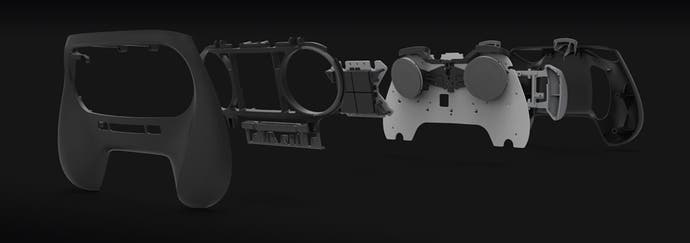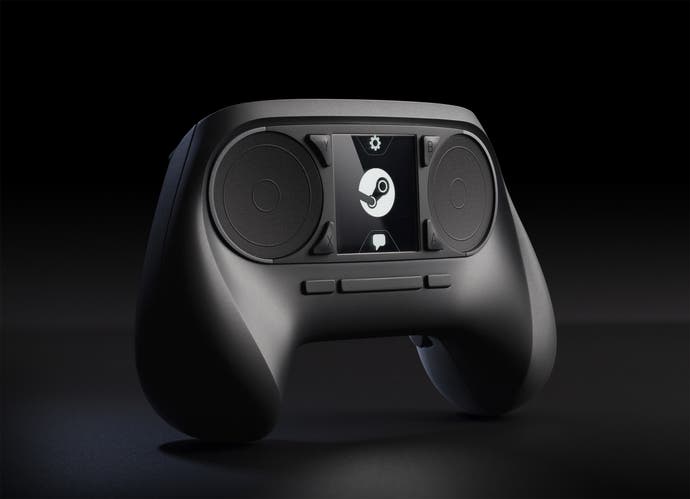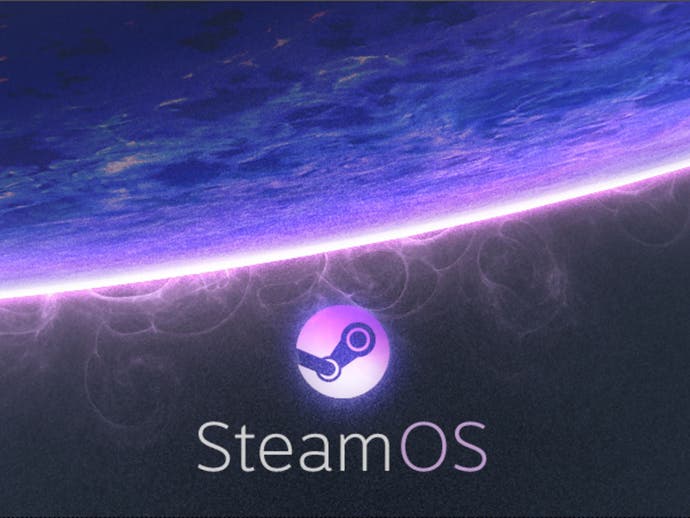Letting off Steam: Dissecting Valve's announcements
With SteamOS, machines and a controller all a reality, where is Valve's new direction taking it?
Over the course of three announcements this week, Valve finally set in stone its vision for taking over the living room, first with the reveal of SteamOS, then later with Steam Machines and a new, somewhat eccentric controller. It's news that's been signposted in interviews with Gabe Newell over the past couple of years, but the ramifications are far-reaching. Here, Eurogamer's writers respond to what the news means, and where it's taking Valve.
Christian Donlan, senior staff writer
Even when Valve isn't making games, it's still making games interesting. Look at that controller: it's big, bold, nutty thinking, and even if you're unconvinced by it, there's something delightful about how unusual it is. I don't yet want one myself, but it's made me realise what's so exciting about the company's advance into the living room: it doesn't seem defeated or scared or antsy about what the competition's up to. It's doing what seems, to Valve, like the natural thing to do, and that's its only concern.
As for the Steam Machine itself, I'm equally excited, although, having bought a decent-ish PC a year or so back, I'll need to see a lot more before I consider buying one. I appreciate the fact that Valve's committed to making stuff people can meddle with to their heart's content - and that seems particularly admirable in an era when Apple's started glueing components into its laptops - but I actually hope there's a certain degree of standardisation in a lot of the various Steam hardware. I know a lot of people who are put off from making the jump to PC by the fact that the PC hardware landscape can look so frightening from the outside. In fact, a box which they know will play Steam games competently with little fuss is probably more important to them, I suspect, than the fact that that box also does it on the living room, in the big TV. Oh yes, and with a gloriously nutty controller.

Wesley Yin-Poole, news editor
While there's much we don't know about the Steam Machines, one thing is clear: Valve is serious about the living room. But the Half-Life maker's got a lot of work to do before one of its boxes edges out my PC.
As a keen Steam Big Picture mode user, I often plug my wired Xbox 360 controller into my PC to play the likes of Far Cry 3 and BioShock Infinite on maximum settings from the comfort of my couch. Why, then, should I fork out my hard-earned cash for a Steam Box when, from the sounds of things, it'll work pretty much like my PC does already?
Valve's vague explanation of SteamOS didn't do much to convince me of its appeal, either. Yes, it's optimised for gaming, and no doubt a vastly leaner drain on PC power than Windows, but I'm all about the games, and this is where Valve needs to show me the money.
If, say, Valve were to announce Left 4 Dead 3 for PC, Mac, Linux and all the rest of it, but Gabe Newell made it clear the Linux version was best, it would spark my, and I'm sure many others', interest.
Until then, I, like Microsoft's Phil Harrison, am happy to simply watch what Valve does with great interest.
Oli Welsh, reviews editor
For me, the least interesting and exciting part of the announcement of the Steam boxes was the announcement of the Steam boxes. This is mostly because Gabe Newell had already outlined Valve's intentions pretty exactly in interviews - although few chose to really believe him - and by their nature those intentions remain vague. We have no industrial design and no system spec because this initiative isn't about those things. And I get that: Valve wants Steam in the living room to be as customisable and open as PC gaming is. More.
But that's a worry for me too, because there's no single engineering vision and no economy of scale being brought to bear on manufacturing these things. And - unlike the easy comparison, Google's entry into smartphones with Android - there aren't a whole bunch of manufacturers already making sleek, mass-market products to partner with. Gaming PCs are ugly and expensive; Dells and the like are cheap and unreliable. I suspect that to begin with, the best way to get a Steam machine will be to build your own, and it will take the involvement of a company like Samsung to turn this into a genuine mass-market proposition. Valve, meanwhile, just looks like it wants to get into hardware without getting its hands dirty.

The Steam OS component of the announcement is the logical part and the easiest to get behind. Most computer gamers can agree that anything that will help cut the umbilical cord to Windows for once and for all is a good thing, and the healthy support of "SteamPlay" titles that work across Windows, Mac and Linux gives the Steam Box a slate of games out of the gate that the next-gen consoles will take years to catch up with.
Widespread cloud-saving, the best digital marketplace for games and compatibility with your computers only sweeten the deal; I'm particularly excited by the idea of a low-power, low-profile living room box that could stream games from my PC. And by centring the initiative on software rather than hardware, Valve has hopefully sidestepped the most depressing aspect of console gaming: the enforced obsolescence that makes you consign your entire games collection to a dusty cupboard every five years. The flipside is that you can't guarantee compatibility and performance in your games, and that's the main reason I don't see Steam box claiming victory over traditional consoles (if that's even what Valve is trying to do).
Which leaves the controller, which for me is simultaneously the most alarming and most exciting part of this announcement. It's already the subject of widespread ridicule and I have major concerns about how good the physical feedback on those touch pads can really be, and about the lack of easy-access face buttons. Over and above that, in an initiative that seems to be all about open design and unfettered access to an existing library of games, asking game developers to add support for a weird new controller design seems like it might be counter-productive.
But. But. I am absolutely going to reserve judgment until I've played on a final design; it's a fool who comes to any conclusions about a game controller based on pictures and feature lists. It's clearly an innovative piece of kit that has the potential to expand the range of games we play on our TVs, and the prospect of what might happen once the community gets its hands on this hackable piece of kit is mind-boggling. I cannot wait to try one.
Valve's announcements this week have underwhelmed many: because they were largely expected, because there was no single console design to allow easy comparison with PlayStation 4 and Xbox One, because there was no Half-Life 3 (as if that was ever going to happen). But what we've seen, while announced with Valve's traditional and sometimes infuriating nonchalance, represents the introduction of a completely new philosophy to console gaming. It's a genuine alternative, based on a proven ecosystem, with a massive catalogue of brilliant games. You can't say that's not exciting. The fact that Valve fundamentally hasn't entered the console war might be the best thing of all.

Martin Robinson, features editor
Valve's announcements hardly came as a surprise to anyone who's paid attention to Gabe Newell's words over the past couple of years. The Steam box and SteamOS are both manifestations of a philosophy that has been telegraphed clearly enough, and they're both as smart and considered as you'd expect from a company as successful as Valve, even if there's still a lack of any tangible details about the hardware itself.
There is now though, a delicious new piece of kit that shows Valve's intentions cast in strange plastic and track pads. The controller's the kind of offbeat design that I was hoping for when Sony and Microsoft announced their plans for the next generation of consoles, a device that's as odd as it is intriguing. Ditching sticks is a bold move, but it's one that seems obvious given the controller's need to support the vast Steam back catalogue.
The controller's masterstroke I think, is presenting a solution that at once supports old games while suggesting new ideas for future ones, even if there's still some concern about how it'll match up to traditional pads and a mouse and keyboard. Is this a design that will prove as revolutionary as Ralph Baer's adoption of the joystick in 1967 or Gunpei Yokoi's introduction of the cross d-pad in 1982, or another false dawn like Kinect? It's hard to say until spending some serious time with the controller, or trying a game designed specifically with it in mind, but it's going to be glorious fun finding out.

